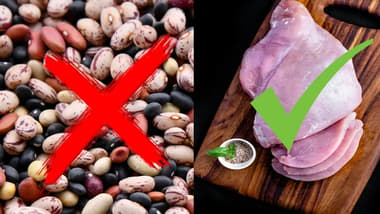

The debate about plant vs. animal protein is often clouded by strong opinions from all sides. Luckily, a recent meta-analysis sheds some much-needed light on the data.
In this meta-analysis, published in Nutrition Reviews earlier this month, the researchers compiled the results from numerous high-quality randomized controlled trials that directly compared plant and animal protein.
To ensure fairness, the studies included in the analysis had to:
When all the data was pooled, animal protein showed a small but statistically significant advantage for increasing and preserving muscle mass compared to plant protein. Meta-analyses are usually considered the gold standard of research.
The "slight edge" for animal protein comes down to a few key factors.
Amino Acid Profile & Leucine: Animal proteins (like whey, casein, beef, and eggs) are typically "complete," meaning they contain all nine essential amino acids our bodies can't make. More importantly, they are rich in the amino acid leucine, which is the primary trigger for muscle protein synthesis (MPS); the process of building new muscle.
Bioavailability: Your body can't use what it can't absorb. Animal proteins are highly bioavailable. In whole plant foods like legumes and grains, a portion of the protein is bound within fibrous material that our digestive enzymes can't easily break down, making some of it inaccessible.
However, not all plant proteins are created equal. Soy protein isolate is a major outlier. It has a leucine content of around 8%, very similar to many animal proteins, and a Protein Digestibility-Corrected Amino Acid Score (PDCAAS) of 1.0—the highest possible score, indicating quality and digestibility. In studies, soy isolate performs nearly identically to its animal-based counterparts.
Perhaps the most important takeaway is that the importance of protein quality depends heavily on protein quantity.
At lower to moderate protein intakes (around 0.8 - 1.2 g/kg of body weight), the quality of your protein source is extremely important. In this range, the superior bioavailability and amino acid profile of animal protein give it a clear advantage. This is especially relevant for those on a budget (a lot of Kenyans) and older adults, who often struggle to eat enough protein.
At higher protein intakes (above 1.6 g/kg of body weight), the difference between sources becomes progressively less important. When you're consuming a large amount of total protein, you’re easily getting enough of every essential amino acid, including leucine, to maximize muscle growth, whether it comes from plants or animals.
So, can you build the same amount of muscle on a plant-based diet? Absolutely, yes.
The science doesn't suggest you must eat animal protein. It simply shows that if you rely on plant-based sources, you need to be a bit more strategic to get the same result.
Here’s the practical advice:
Beyond conventional sources, Kenya also has traditional high-protein foods like kumbekumbe and affordable options like omena that provide complete amino acid profiles.
The debate isn't about one source being "good" and the other "bad." It's about understanding the properties of the foods you eat so you can build a diet that effectively fuels your goals, regardless of your dietary preferences.
Continue reading with these related fitness and health articles




Join the conversation!
Share your thoughts on "Plant vs. Animal Protein: The Source actually Matters - New Research" below.